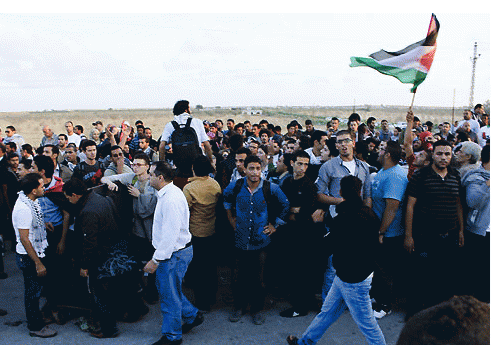Revolutions across the Middle East and North Africa have dramatically shifted the balance of power in the region, writes John Rose
There was mounting panic in Washington, London and other capital cities at the beginning of this week. It was caused by the prospect of an Israeli ground invasion of Gaza.
Combined with the unpredictable consequences of the Arab Spring this would plunge the region into even greater chaos.
On Saturday hundreds of thousands were on the streets of Jordan both in solidarity with Gaza and calling for the fall of the regime. They are ruled by pro-Western despot King Abdullah.
The panic at the top is a recognition of a new kind of Arab politics emerging from below, finally corroding Western domination.
Youngsters in the Israeli-occupied West Bank belonging to the Fatah group also took to the streets to demonstrate this week.
They did so not only in solidarity with Gaza but also against Mahmoud Abbas, the discredited leader of the Palestinian Authority and Fatah.
There are voices calling for an Arab Spring-inspired struggle for democratic rights. They demand one person one vote throughout Israel and the occupied territories--crucially involving the millions of Palestinian refugees. Such a revolutionary game changer would spell the end of Zionism.
Israel has very different ideas. It wants Egypt to absorb Gaza, carve up the West Bank with Jordan, and retain just a few Palestinian villages making traditional handicraft for tourists.
Competing
The struggle over these competing solutions has just begun. Its outcome will be determined by the Arab Spring.
The decisive player in the new politics is Egypt. Its new, democratically elected Muslim Brotherhood government is already caught in the contradictions of power.
It has a choice--to retain the pro-US, pro-Israeli policies of toppled dictator Hosni Mubarak or to support the overwhelming pro-Palestinian aspirations of the Egyptian people.
This was brilliantly exposed by Egypt's Revolutionary Socialists when they called on the new government to stand by its pre-election policies.
These include permanently opening the Rafah crossing on the Egypt/Gaza border, to provide proper relief and to abolish the Camp David peace accords with Israel or at the very least organise a referendum.
Socialist Worker has long argued that the key to the liberation of the Palestinian people lies in the power of the Egyptian working class.
(Note: You can view every article as one long page if you sign up as an Advocate Member, or higher).





